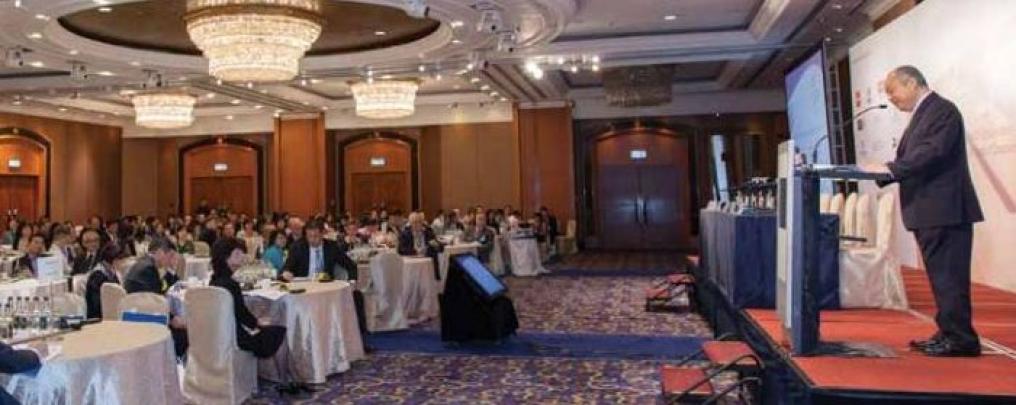Increasingly company secretaries in Hong Kong need to keep an eye on international developments in anti-corruption compliance. International initiatives in combating corruption, together with overseas anti-corruption legislation with an extraterritorial reach, have made anti-corruption compliance a global concern.
E dith Shih, HKICS President, wrote in her President's Message in the July edition of this journal that company secretaries should encourage and embrace professional judgement. As Hong Kong has a principles-based regulatory environment, company secretaries should use their skills, knowledge and experience to advise the chairman and board of directors in respect of corporate governance. Compliance with anti-corruption laws, enhancing ethics and the company's reputation are among the major areas included within this duty. Company secretaries should serve as a bridge in terms of communicating anti-corruption policies to all staff in the corporation and assisting the board to establish an anti-corruption policy, an ethical culture and a corruption-free environment.
Apart from helping to establish clear company policies to combat corruption, it is necessary for company secretaries to implement detailed guidelines and procedures to prevent and detect corruption effectively. These procedures have to be regularly reviewed, updated and followed by staff at all levels. Subject to contractual agreements, appropriate procedures should cover third parties such as agents, contractors and joint venture partners. Company secretaries should ensure effective communication and provide training to alert all staff to the risk involved in handling price-sensitive information or transactions with a high exposure to corruption. They should establish a structure to monitor and review the proper implementation of compliance programmes and provide positive support for the observance of ethics and compliance in the company.
While these anti-corruption measures make sense from an ethical point of view, company secretaries will be well aware that this is also a compliance issue. Companies in Hong Kong clearly need to comply with Hong Kong's Prevention of Bribery Ordinance, but over the last decade there have been a number of international initiatives in combating corruption, together new overseas anti-corruption laws with an extraterritorial reach, so their compliance programmes should not be solely focused on local legal requirements.
Global initiatives
The United Nations Convention Against Corruption (UNCAC) is the most recent major attempt by the international community to combat corruption. Enforced in December 2005, it is a treaty between state parties and has wide implications for international cooperation. Anti-corruption is no longer constrained by state boundaries. With increasing international co-operation, criminal proceeds can be traced and recovered across country boundaries. The increasing effort to exchange information and offer technical assistance in intelligence gathering and analysis has enhanced the prosecution rate.
Article 5(2) of UNCAC commits state parties to establish and promote effective practices aimed at the prevention of corruption, while Article 61(2) encourages state parties to share information with a view to developing common definitions, standards and methodologies for the development of best practices to prevent and combat corruption. As a result, resources, guidelines and best practices such as TRACK (Tools and Resources for Anti-Corruption Knowledge) and Good Practice Guidance (from the OECD) have become available for reference by public and private enterprises, especially for multinational corporations which are more exposed to cross-border risks in corruption.
UNCAC also includes clauses against corruption in the private sector. Article 12(c), for example, requires member countries to establish measures to identify the legal and natural persons involved in the establishment and management of corporate entities. Such measures are designed to boost efforts in combating money laundering and help recover the criminal proceeds of corrupt activities.
Another international initiative company secretaries should be aware of is the OECD Anti-Bribery Convention. As of May 2012 there were 39 signatory countries to the Convention, including non-OECD countries such as Australia, New Zealand, Japan, Korea, Argentina, Brazil, Canada, Chile, Mexico, the US and South Africa. The Convention, which has been in force since 1999, provides directives for signatory countries to implement measures against corruption in international business, in particular:
• to establish the liability of legal persons for the bribery of a foreign public official (Article 2) – in addition, Article 3(2) stipulates that legal persons shall be subject to effective and proportionate non-criminal sanctions
• to review the legal basis for jurisdictions to ensure the effectiveness of the fight against cross-border bribery acts, and
• to make the act of incitement, aiding and abetting or authorisation of bribery a criminal offence (Article 1(2)).
One of the main themes of the OECD Convention is to criminalise the giving of bribes to foreign public officials to obtain international business deals. The Convention also requires signatory parties to strengthen measures to counter money laundering activities and to offer mutual legal assistance. Subsequent to the enforcement of the Convention, recommendations to further counter corruption activities have been issued, such as the recommendation issued on 25 May 2009 to disallow tax deductibility of bribes to foreign public officials or expenditures in furtherance of corrupt activities. More importantly, denial of tax deductibility is not contingent on the conducting of investigations or initiation of court proceedings.
Overseas anti-corruption legislation
As mentioned above, company secretaries should also be aware of overseas anti-corruption legislation with an extraterritorial reach, notably the US Foreign Corrupt Practices Act (FCPA) enacted in 1977 and the UK Bribery Act enacted in 2011.
Like the OECD Anti-Bribery Convention, the FCPA is mainly designed to combat the bribery of foreign officials. For example, the FCPA specifies that it is an offence to bribe foreign government officials to obtain or retain business. Under the FCPA, both foreign and domestic issuers on US security exchanges must comply with the requirements to keep records and accounts in reasonable detail to accurately reflect the transactions of the issuers. Annual reports must be certified by independent auditors and issuers are required to file quarterly reports as prescribed by the Securities and Exchange Commission.
The FCPA also covers the civil and criminal liability of corporations and individual directors. It does not require proof of actual knowledge, nor the intent to promise or to actually pay a bribe. A corporation may be held criminally liable for the acts of its agents including employees if the agent commits a crime within the scope of his employment and with intent to benefit the corporation. As regards civil action, Section 78dd-2(d) stipulates that the Attorney General may apply for an injunctive relief against a domestic concern or the officer, employee, agent or stockholder of that concern.
The penalty for bribery applied to individuals is up to five years imprisonment and fines of up to US$250,000. As for corporations, the fine is up to US$2 million.
The UK Bribery Act makes it an offence to offer a bribe to, or accept a bribe from, another person including foreign public officials. Under the Act, two types of criminal liability can be applied to corporations – offences involving fraud in which proof of intention is required and offences of strict liability where there is no need to prove intention.
Criminal liability of a corporation arises when the offence can be attributed to someone who is the directing mind of the company, for example the CEO. Corporate criminal liability may also arise when the board of directors has delegated its management functions and the delegate has full discretion to act independently of instructions from the board. The delegate would normally be a senior officer of the company and there is a distinction between an employee who is a mere agent and those who have the full authority of the board or the owner of the company. A less senior member of staff, such as a branch manager, would not be identified with the company where the board has not delegated any part of its functions to the employee and where his acts are not acts of the company.
The extraterritorial reach of these Ordinances
US security issuers, whether 'domestic concerns’ or foreign companies, can be held liable for an offence under the FCPA. An issuer is defined as a corporation that has issued securities on the US securities exchanges. A 'domestic concern’ is any individual, corporation or business entity with its principal place of business in the US.
Issuers and domestic concerns are held liable if they act in furtherance of a corrupt payment to a foreign official. US nationals and corporations may also be held liable for acts in furtherance of corrupt payments authorised by employees or agents outside the US, including foreign subsidiaries. A foreign company or person is subject to the FCPA if it causes an act in furtherance of corrupt payments to take place within the US. The action may be as slight as making a transfer to a US bank account or registering American Depository Receipts.
Similarly, Section 12(4) of the UK Bribery Act extends the jurisdiction of the Act to offences committed by persons in and outside the UK as long as these persons have close connections with the UK. Such persons include UK citizens and non-UK nationals ordinarily resident in the UK, and they are also liable for offences committed abroad. Moreover, under Section 7, non-UK commercial organisations are subject to the Act if they carry on a business or part of a business in the UK. This includes setting up an office in the UK, but does not necessarily include listing on a UK stock exchange or merely raising finance there.
There is a difference in terms of jurisdictional reach between the offence of failing to prevent bribery (see Section 7) and the offence of committing the act of bribery (see Sections 1&2). The former extends to foreign corporations (relevant commercial organisations under Section 7(1)) which carry on businesses or part of a business in the UK, while the latter is confined to persons, corporations or entities with a close connection with the UK, for example UK subjects and foreign nationals habitually resident in the UK. Under Section 7(1), a relevant commercial organisation can be guilty of an offence if an 'associated person’ of that company commits a bribery offence. An associated person can be a legal or natural person who performs services for and on behalf of the company, regardless of their capacity. Contractors can be associated persons if they perform services for and on behalf of the company. Suppliers are not associated persons if they do no more than supplying goods and services to the company.
The treatment of joint venture (JV) companies is more complicated. The company through an investment of ownership of a JV company benefiting from a bribe offered from an employee of that JV company is unlikely to be liable. However the company would be held liable if the JV company is performing services for and on behalf of the company and the bribe is intended to benefit the investing company. Hence, the degree of control the investing company exercises on the JV company is a key factor to be considered when measuring liabilities.
Hong Kong's Prevention of Bribery Ordinance
This article has focused on global developments in anti-corruption compliance on the basis that readers will be less familiar with these than with local requirements. Compliance programmes also clearly need, however, to take into account Hong Kong's own Prevention of Bribery Ordinance (POBO). Enacted in 1971, the POBO provides separate sections to target different forms of bribery. Section 4 targets the bribery of officials, including the Chief Executive. It imposes an offence of offering or accepting advantages as an inducement to perform any improper act contrary to their capacity as civil servants. Section 3 of the same ordinance imposes an offence for any prescribed officer to accept advantage without the approval of the Chief Executive. There is no need to prove the linkage of the acceptance of advantage to the performance of an improper act in his or her official capacity. The prosecution needs to prove no more than that the prescribed officer intends to solicit or accept an advantage.
For the private sector, Section 9 of the POBO applies to offences of any 'agents’, generally referring to employees, soliciting or accepting an advantage as an inducement to do, or forbear to do, any act in relation to the principal's affairs contrary to his/ her duties. It is also an offence for anyone to offer an advantage to an agent as an inducement to show favour or disfavour to any person in relation to his or her principal's business. However, neither of these persons are guilty of offences if permissions are granted by their principals before the offer and acceptance of the advantage. There is no specific clause in the POBO giving extraterritorial reach to the offences committed by Hong Kong subjects outside Hong Kong territory. However, Section 4(2) of the POBO prohibits civil servants from soliciting or accepting advantages without lawful authority, whether in Hong Kong or elsewhere, as an inducement for not performing their proper official duties.
Daniel Wong CPA(Aust) ACS ACIS
SIDEBAR: Recommendations: a search for best practice
To effectively deter corruption in corporations operating in a multinational environment, it is necessary to consider three aspects – prevention, education and enforcement.
1. Prevention
• implement effective human resources management by: avoiding conflicts of interest; separating duties which have a potential risk of bribery; enforcing checks and balances; rotating staff on an irregular basis to assume different responsibilities for different geographical regions
• make management accountable for suspicious transactions
• involve senior management/ board members in developing governance and anti-corruption policies (such as the policy on commissions and rebates)
• enhance corporate transparency (declare outside investments and business involvement or work)
• establish a code of conduct and a checklist for corporate integrity management and conduct integrity checks
• enforce due diligence and internal controls
• automate and streamline manual processes; implement effective control of data especially for price-sensitive information; strengthen data security; use IT systems to manage and review controls; keep proper records
• conduct risk analysis and control (identify high-risk functions such as procurement, recruitment and the setting of senior officers’ remuneration), and
• extend communication to all stakeholders, including third parties such as agents, intermediates, contractors and joint venture partners.
2. Education
• conduct periodic briefing of anti-corruption best practices for the board and stakeholders, and
• reward good and ethical behaviour.
3. Enforcement
• conduct regular internal audits and random and irregular checks on quotations
• verify contracts directly with vendors and contact suppliers for their reasons for not submitting bids
• meet with major vendors and clients – senior management should also review frontline operations regularly
• establish procedures to facilitate whistleblowing and direct access to the CEO and board of directors, and
• establish the organisation structure, authority, guideline and procedures for monitoring of corruption reports passed to external law enforcement agencies.
Regarding prevention measures, it should also be noted that under Section 7(2) of the UK Bribery Act it is a defence if organisations and individuals can show they have in place 'adequate procedures’ to prevent the act of bribery. The meaning of 'adequate procedures’ is not well defined under the Act, but legal cases can be used as a reference for the scope and required substance of such procedures. For example, a UK insurance broker was fined £6.9m for failing to implement effective systems to prevent bribery in the international operations of his firm. The broker had not conducted sufficient due diligence to manage the overseas intermediates leading to unacceptable risks that payments to third parties would be passed on as bribes. It was not necessary to prove that actual bribes were offered.



